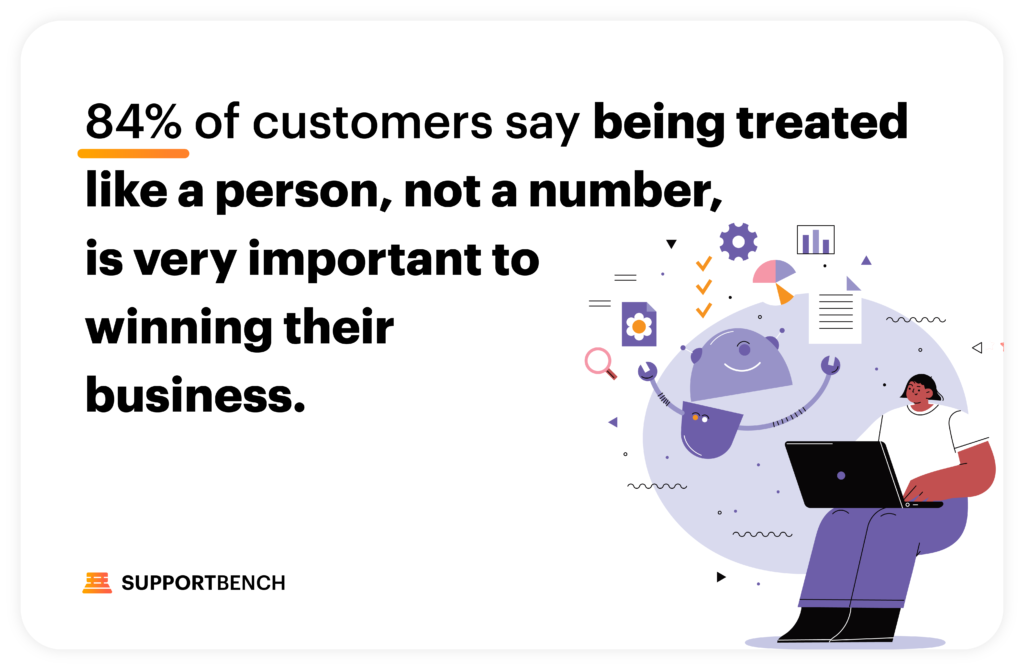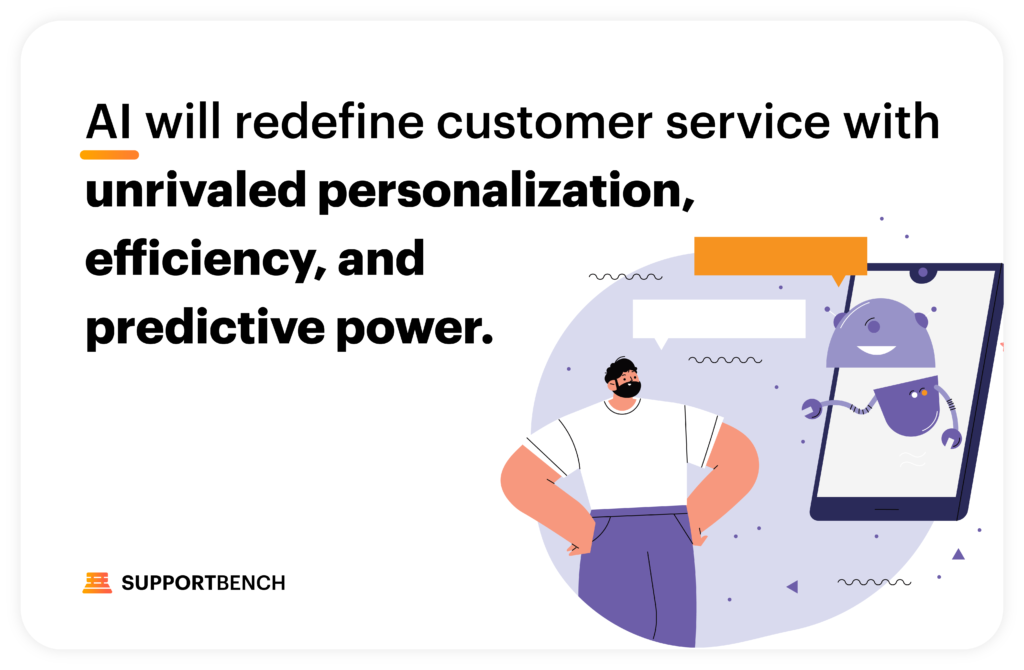Customer service and support in the B2B environment have witnessed a remarkable evolution over the years. The advent of recurring revenue models and the shift toward customer success has marked significant milestones in this progression. The next transformative leap in this arena is the integration of Artificial Intelligence (AI), a development that promises to revolutionize customer experiences. While chatbots present the most visible manifestation of AI in customer service, the potential of AI extends far beyond.
AI is poised to transform customer support software into a veritable source of intelligence that will enhance various aspects, including knowledge management, prioritization, issue resolution, and more. This article aims to delve into the pivotal role of AI in B2B enterprise customer service and support, its present applications, and future implications.
AI: The New Architect of Customer Service Philosophy

Customer service philosophy is the heart and soul of an organization’s interaction with its customers. It dictates the overall approach and principles that guide the delivery of service to customers. Traditionally, this philosophy revolved around human-led interactions, with decisions primarily based on human discretion and established protocols.
However, with the advent of Artificial Intelligence (AI), there’s been a seismic shift in this traditional customer service philosophy. AI has emerged as a powerful tool that enables organizations to deliver highly efficient, personalized, and proactive service, thereby significantly enhancing customer satisfaction and loyalty. It not only changes the way customer service is delivered but also reshapes the very philosophy guiding it.
AI’s impact on customer service philosophy is multi-faceted. One key area where AI marks a distinct departure from traditional practices is personalization. Traditional customer service, while aiming for personalized interactions, often falls short due to the limitations of manual processes and the lack of real-time insights into customer behavior. AI, on the other hand, excels in delivering personalized experiences by analyzing vast amounts of customer data, predicting customer behavior, and tailoring interactions accordingly.
According to a study by Salesforce, 84% of customers say being treated like a person, not a number, is very important to winning their business. AI’s ability to analyze individual customer data and personalize interactions accordingly can significantly enhance customer satisfaction and loyalty.
Take, for instance, a global online retailer dealing with thousands of customer queries and requests every day. The traditional approach would involve support agents responding to each query based on pre-set protocols and their understanding of the customer’s issue. However, this method could lead to inconsistent service, with the quality of the interaction heavily dependent on the agent’s skills and experience.
By integrating AI into their customer service operations, the retailer can ensure a consistent and personalized customer experience. AI can analyze each customer’s interaction history, preferences, and behavior to provide a tailored service. For instance, if a repeat customer contacts support, the AI system can instantly provide the agent with the customer’s history, including past issues and preferences, enabling the agent to deliver a highly personalized service.
AI can also automate routine tasks, freeing up agents to focus on more complex issues requiring human intervention. This not only improves efficiency but also allows for a more empathetic and nuanced approach to customer service, a crucial aspect often missed in traditional customer service operations.
In essence, AI is transforming the customer service philosophy from a one-size-fits-all approach to a highly personalized and efficient one. This shift not only enhances customer satisfaction but also improves operational efficiency, making AI an indispensable part of the modern customer service philosophy.
Knowledge Management
Knowledge management is an integral part of an enterprise’s customer service philosophy. Traditionally, knowledge management involved manually created and maintained databases. However, AI has the potential to revolutionize this process. AI-driven platforms like Supportbench can automatically generate knowledge base articles using AI-driven summaries, thus reducing the time spent by support agents in creating them manually.
AI can also employ machine learning algorithms to analyze past interactions and customer queries, identify patterns, and update the knowledge base in real-time, ensuring that the support team has the most up-to-date and relevant information at their disposal.
Prioritization
In a high-volume customer support environment, prioritizing issues is a key determinant of efficiency and customer satisfaction. AI can facilitate prioritization by analyzing several factors such as the urgency of the issue, customer importance, and historical data. For instance, Supportbench’s dynamic SLAs allow for tailored customer experiences based on the case context. This ensures that critical issues get addressed promptly, thereby enhancing the customer experience.
Personalization
In the age of the customer, personalization forms a cornerstone of an effective customer service philosophy. AI aids in delivering personalized experiences by analyzing customer data, predicting customer behavior, and customizing interactions accordingly. It can provide suggestions to support agents on how to handle specific customers based on past interactions, purchase history, and customer preferences. This not only improves the customer’s experience but also helps agents become more efficient and effective.
Issue Resolution
AI is instrumental in improving issue resolution in customer support. With AI, support teams can automate routine tasks, leaving more complex issues to the human agents. AI-powered chatbots can handle basic queries, freeing up agents to deal with more complex issues. Moreover, AI can provide real-time guidance to agents during interactions, suggesting responses based on historical data and real-time analysis, thereby improving first-contact resolution rates.
Statistics and Reporting
AI’s ability to analyze massive amounts of data quickly and accurately is a game-changer for statistics and reporting. By employing AI, organizations can generate insights that were previously impossible or too time-consuming to obtain. This includes sentiment analysis, intent detection, and emotional scoring, all of which can provide valuable insights into customer satisfaction and the overall effectiveness of the support team.
Deflection
AI plays a significant role in deflecting customer queries, thereby reducing the load on support teams. AI-powered chatbots can handle simple queries, allowing human agents to focus on complex issues that require a human touch. With AI, organizations can deflect a significant portion of their customer interactions, leading to more efficient use of resources and improved customer satisfaction
Customer Experience
The role of AI in shaping customer experience is unquestionable. From personalizing customer interactions to predicting customer behavior, AI offers a host of capabilities that can enhance the customer journey. For example, Supportbench’s customer health scoring system uses AI to monitor and evaluate customer experiences, providing valuable insights that can guide customer support strategies.
AI’s role also extends to enabling seamless interactions across various channels. Whether it’s through chatbots, social media, email, or phone, AI ensures that customers receive consistent and personalized service across all touchpoints. This omnichannel approach powered by AI significantly enhances customer experience and satisfaction.
Customer Success
Customer success is the ultimate goal of any customer service philosophy. AI helps businesses achieve this by providing valuable insights into customer behavior and preferences, allowing companies to align their strategies with customer needs. AI-powered platforms like Supportbench provide 360-degree customer overviews and reporting, enabling organizations to track customer interactions and success metrics in real-time.
AI allows for proactive customer success management. By analyzing customer data, AI can predict potential issues and allow businesses to address them before they escalate, thereby ensuring customer success.
The Future of AI in B2B Customer Service and Support

As we move into the future, the role of AI in B2B customer service and support is set to expand even further. Advanced AI models, like OpenAI and LLM, promise to enhance the capabilities of AI in customer support, making it an indispensable part of the B2B customer service landscape.
AI is expected to become even more sophisticated at understanding and predicting customer behavior, allowing for an unprecedented level of personalization in customer interactions. With advances in Natural Language Processing (NLP), AI will become better at understanding human language, enabling more efficient and effective customer interactions.
AI will play a significant role in the evolution of self-service options. As AI becomes more intelligent and intuitive, customers will be able to resolve more complex issues independently, leading to higher satisfaction levels and more efficient use of support resources.
AI will also become more integral to decision-making in customer support. With AI’s ability to analyze vast amounts of data and generate insights, businesses will be able to make more informed decisions that align with their customer service philosophy and drive customer satisfaction and success.
In a nutshell, AI will not only continue to enhance the efficiency and effectiveness of customer service operations but also redefine the customer service philosophy in the B2B space.
In Summary
The integration of AI in B2B enterprise customer service and support is not just a trend, but a necessity. With its ability to streamline operations, personalize interactions, and drive customer success, AI is poised to revolutionize the way businesses approach customer service.
While the journey of AI in customer service is just beginning, platforms like Supportbench are leading the charge, showcasing the transformative power of AI in delivering superior customer experiences. As we move into the future, the role of AI in shaping the customer service philosophy will only grow, paving the way for a new era of customer service in the B2B space.
As Bill Gates once said, “We are changing the world with technology.” The application of AI in B2B customer service and support is a testament to this transformation, and we are just scratching the surface of its potential.
In this era of customer-centricity, the success of a business largely depends on its ability to deliver superior customer experiences. With AI, businesses have the opportunity to redefine their customer service philosophy and set new standards in customer satisfaction and success. The future of B2B customer service lies in the intelligent application of AI, and the time to embrace this transformation is now.















